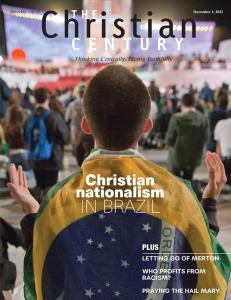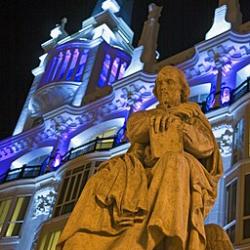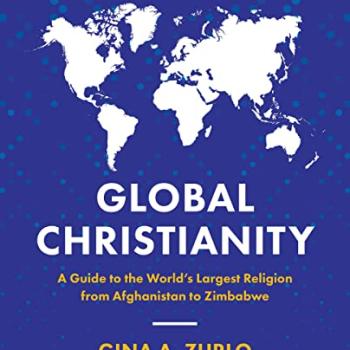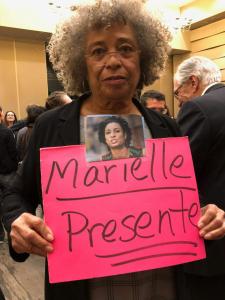I have been thinking a lot about Jair Bolsonaro, the “Trump of the Tropics,” president of Brazil, my home country. I spent considerable time in Brazil in the last couple of years, traveling in the Northeastern part of the country, visiting family and researching for a forthcoming book. Bolsonaro lost in the 2018 elections in the Brazilian Northeast and will likely lose again this year. Nevertheless, even in that region, most evangelical pastors (read: Protestant) find themselves in one of two general categories: (1) those who are clearly for Bolsonaro and (2) pastors who would put their careers at risk if they voiced any consistent opposition to Bolsonaro’s aggressively conservative politics. Bolsonaro is the face of Christian Nationalism in Brazil. If you are unfamiliar with his complex trajectory, the piece Raimundo Barreto and I co-wrote, featured on the cover of The Christian Century in December, might help give some context.

After watching the new PBS documentary Rise of the Bolsonaros over the weekend, I remembered some reactions from Brazilian evangelical pastors to one of my books, titled O Racismo na História Batista Brasileira. The book, my only one in Portuguese, did not mention Bolsonaro explicitly but addressed an issue constitutive of Brazilian society that Bolsonaro is infamous for representing, namely, racism. Naturally, I received strong reactions from conservative sectors of Brazilian evangelicalism—especially Baptists, whose history the book engages more directly.
One of these reactions to my book was a public letter/manifesto released nearly two years ago. The document was signed by several hundred pastors who reacted to aspects of their history found in my work that they did not like; it was titled “Open Letter to Pastors and Churches of the Brazilian Baptist Convention.” Its main objective was to resist what the authors and signatories saw as threatening to the gospel they follow. In short, despite its doctrinal language, the document’s spirit can be interpreted as a series of affirmations of a predominantly reactionary, cultural nature: women are not equal; LGBTQ+ people are not equal; racism, although undeniable, is not something that we should fight.
Two sections of the document were of particular interest to me: “1- We believe in the equality of men before God, and we repudiate any type of discrimination, prejudice and racism”; and “2- Considering this, we regret the presence in the Baptist environment of those who make ideological speeches against what they call ‘racism,’ but value certain lives over others; they deny the value of the history of Brazilian Baptists and despise those who gave their lives for the denomination, especially missionaries and pioneers whom they accuse of racism and because they advocate the ‘cultural decolonization’ of the Brazilian Baptist Convention; teach other theologies — Black/feminist/inclusive, etc. — in our churches, seminars and events, as well as address these topics in social media posts.” They repudiate discrimination and racism on the one hand; condemn Black and feminist theology on the other. Go figure!
The histories and theologies accepted by the groups of pastors who authored and signed this document mirror the convictions of their forebears—the Southern Baptist Convention—which they seem to internalize as God’s truth. No other theologies are to be taught; no different histories are to be told. The theologically, socially, and politically conservative disposition of Brazilian evangelicalism, however, is neither exclusive to the Baptist fold nor only present in Brazil. The conservatism of evangélicos is so pronounced in Latin America that Virginia Garrard noted, in her new book that traces local vernacular Christianities titled The New Faces of God in Latin America, the widespread influence of conservative evangelical literature from the US in Spanish and Portuguese. She also noted that theologies of inculturation that loosen the colonial and imperialist hold of White theologies in the region are predominantly a Roman Catholic phenomenon. In this context, evangélico favoritism of Bolsonaro is no surprise.
Yet, some US-based accounts of Latin American evangelicalism, intentionally or not, often obscure this fact by characterizing evangélicos as a simultaneously theologically conservative and socially progressive group. Of course, there are examples of evangélicos who are socially progressive, even if their progressiveness is only seen as “progressive” by other evangélicos/evangelicals. Nevertheless, their voice is not representative or even a majority. Bolsonaro helped clarify that for many, including the specialists on the history of Latin American evangelicalism who have had limited sustained exposure to the group in the region and/or who are committed to using a particular construction of evangélico history that emphasizes their hopes for what they think US evangelicalism could be.

However, the hold Bolsonaro has on the evangelical imagination may be weakening, even in light of the intense conservatism of evangélicos. Just two weeks before Brazil’s first round of presidential elections, Lula da Silva, Bolsonaro’s strongest opponent, appears in the polls as the clear favorite. Lula holds 54% of the Catholic electorate and 28% of evangelicals—a projection representing his growth among evangelical voters. This growth resulted from the Workers Party’s robust courting of the evangelical vote. Lula’s campaign mobilized progressive pastors and theologians and disseminated messages thanking evangelicals for their work in evangelization and charity. Lula met with several evangelicals groups and said, among other things, that “God guides his steps” and that Bolsonaro is “demon-possessed.” But the evangélico arsenal remains on Bolsonaro’s corner.
A recent analysis of evangélico social media influencers shows that they speak more of their support of Bolsonaro than religion. The ten most popular hashtags in Brazilian evangelical social media include nine favorable mentions or allusions to Bolsonaro. They are (my translation): #togetherwithbolsonaro, #bolsonaroreelected2022, #bolsonaroelectedonfirstround, #b22, #togetherwithbolsonaro2022, #godnationfamilyfreedom, #silasmalafaia, #strongrightwing, and #strenghtandhonor. An elected official supporting Bolsonaro summarized the impressions from the Bolsonaro camp regarding evangélicos: “The evangelicals have never abandoned the [Bolsonaro] government, and will show once again the difference they can make.”

Looking at the current state of Brazilian politics and religious history as someone who lives a transnational life between Brazil and the United States—the two countries with the largest Christian populations in the world—I cannot help but pause when I look at the shifts in the religious affiliations of the Brazilian people. Growing up Protestant in a majority Roman Catholic setting—and being bullied repeatedly for being Protestant—I could not even imagine the day evangélicos would have so much power and numbers as they do today. Yet I mourn at what this growth has come to represent in light of what I see, in retrospect, as the consistent choices of the majority of Brazilian evangélicos. The support evangélico leaders have had from authoritarian dictators who favored Protestants partially as a mechanism for dismantling socially-progressive Catholicism was central to this shift. Bolsonaro’s praise of dictators, paired with the evangélico support for his government, is reminiscent of how ready to side with violent authoritarian figures evangélicos have been. The more they grow, the more they can help political projects of a particular persuasion.
The Protestant resistance has their work cut out for them—and they will be aided by, among other things, literature produced in the US but not often translated into Portuguese. I will touch on that more intentionally in my next post. Still, here I will mention that the recent translations of Beth Barr’s and Kristen Du Mez’s books will be part of the tools for resisting the common evangélico disposition.













